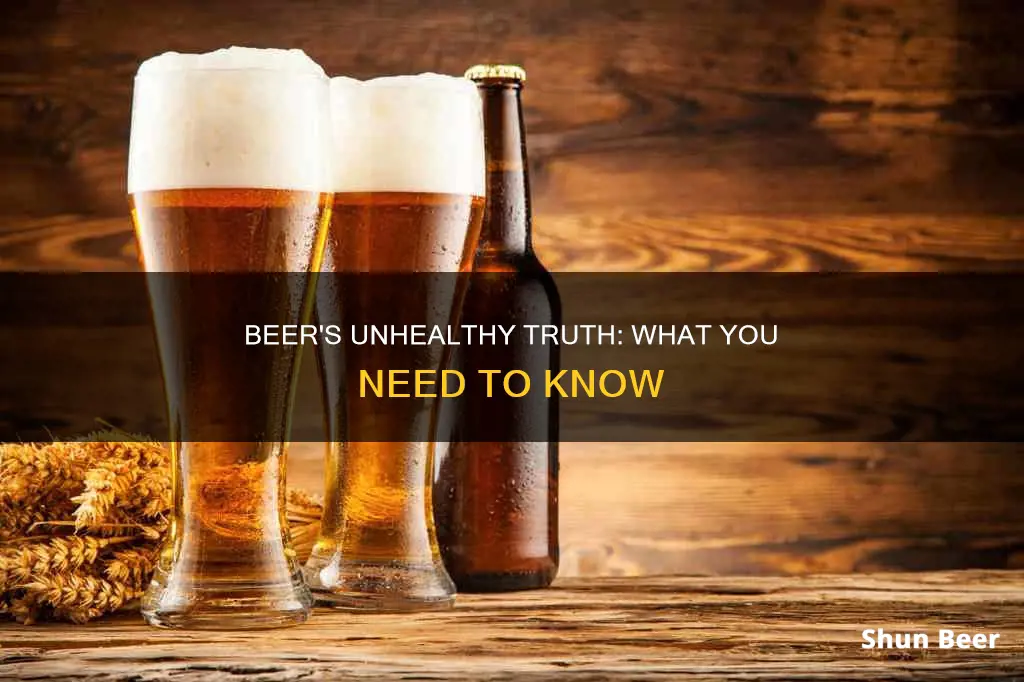
Beer is a popular alcoholic drink that has existed for thousands of years. While it may offer some health benefits, excessive consumption can lead to various health issues.
Beer is made by fermenting grain into alcohol, and it typically contains 4-6% alcohol, although this can range from 0.5-40%. It is often viewed as a drink with little nutritional value, but it does contain minerals such as magnesium, potassium, selenium, and vitamins like vitamin B1, B2, B3, B5, and B12.
Light to moderate beer intake, defined as up to one drink per day for women and up to two drinks per day for men, has been associated with a lower risk of heart disease, improved blood sugar control, stronger bones, and reduced dementia risk.
However, heavy and binge drinking can have harmful effects, including an increased risk of early death, alcohol dependence, depression, liver disease, weight gain, and cancers. Additionally, beer contains empty calories, which can contribute to weight gain and obesity, further increasing the risk of health issues.
Therefore, while beer may have some benefits, excessive consumption can lead to negative health consequences.
| Characteristics | Values |
|---|---|
| Addiction | Alcohol is an addictive substance, and heavy drinking can lead to alcohol dependency. |
| Life Expectancy | Heavy consumption can reduce life expectancy by up to 28 years. |
| Liver Disease | Drinking more than two beers a day can increase the risk of fatty liver disease and cirrhosis. |
| Weight Gain | Beer is high in calories, which can lead to weight gain and a "beer belly". |
| Cancer | Any alcohol intake is associated with an increased risk of cancers, including throat and mouth cancers. |
| Depression | Heavy and binge drinking is associated with a higher risk of depression. |
| Death | Heavy and binge drinking increases the risk of early death. |
| Dementia | Heavy alcohol consumption can increase the risk of dementia. |
| Cardiovascular Disease | Excessive beer consumption can lead to cardiovascular disease. |
| Neuropsychiatric Diseases | Heavy or excessive drinking may lead to neuropsychiatric diseases. |
| Risky Behaviour | Excessive drinking may lead to risky behaviour, potentially resulting in major bodily injury or death. |
What You'll Learn

Beer can increase the risk of liver disease
Beer is a drink made by fermenting sugars from starches. Barley, hops, water, and yeast are its major components. It can be alcoholic or non-alcoholic. Typical American alcoholic beers average 4% to 5% alcohol (ethanol) by volume, but some can be much higher. Drinking more than two beers a day can increase the chances of developing fatty liver disease, or cirrhosis.
How Alcohol Affects the Liver
Alcohol is broken down by the liver. Drinking more alcohol than the liver can process can cause serious damage to the organ. Alcohol-associated liver disease is common but preventable. There are three types of alcohol-induced liver disease:
- Steatotic (fatty) liver: This is the most common alcohol-induced liver problem. It is caused by the build-up of fat inside liver cells, leading to an enlarged liver.
- Acute hepatitis: Alcohol-associated hepatitis is an acute inflammation of the liver, resulting in the death of liver cells and often followed by permanent scarring.
- Cirrhosis: Alcohol-associated cirrhosis is the destruction of normal liver tissue. It leaves behind scar tissue instead of healthy, functioning liver tissue.
Risk Factors
The effects of alcohol on the liver depend on how much and how long a person has been drinking. Other risk factors include:
- Being female: Women may be at higher risk of liver cirrhosis even with little alcohol consumption.
- Binge drinking: Binge drinking is defined as consuming four or more drinks (for women) or five or more drinks (for men) in a couple of hours. Extreme binge drinking is drinking at levels far beyond this threshold.
- Obesity: Excess weight compounds the liver damage caused by drinking too much.
Treatment
The good news is that the liver has a unique ability to heal itself and replace damaged tissue with new cells. If liver disease is diagnosed early, doctors can treat it. However, if liver disease is diagnosed in later stages, cirrhosis can develop into an irreversible condition, putting patients at higher risk for liver cancer. In advanced cases, the only treatment is a liver transplant.
Beer for Horses: Healthy Treat or Harmful Indulgence?
You may want to see also

Beer can cause weight gain and obesity
Beer is a drink that has been enjoyed for thousands of years and is now found in grocery stores and breweries worldwide. However, despite its rich history and cultural importance, beer has several drawbacks that can negatively impact health, including weight gain and obesity.
Beer is high in carbohydrates and calories, with a typical 12-ounce can containing 13 grams of carbohydrates and 153 calories. The alcohol content of beer is usually between 4% and 6%, but it can range from 0.5% to 40%. The more alcohol a beer contains, the more calories it has. Beer is also often consumed in excess, with people drinking more than one beer a day or engaging in regular binge drinking. This leads to a significant increase in overall calorie intake, as the calories from alcohol are not compensated for by eating less of other foods.
In addition to excess calorie consumption, beer may prevent fat burning. This is because the body prioritizes the breakdown of alcohol over other sources of fuel, including stored fat. As a result, regular drinking, especially in excess of 17 ounces (500 ml) per day, can contribute to an increase in body fat, including belly fat. This is often referred to as a "beer belly," which is more common in men due to differences in metabolism and the tendency to drink more heavily than women.
The flowers of the hop plant, used to flavour beer, are also high in phytoestrogens, plant compounds that can mimic the female sex hormone estrogen. It has been suggested that these phytoestrogens may cause hormonal changes in men, increasing the risk of storing belly fat. However, the effects of phytoestrogens on weight and belly fat are still unknown.
While moderate drinking of one beer per day or less may not lead to significant weight gain, heavy drinking or regular binge drinking puts individuals at a very high risk of belly fat gain and various other serious health problems. Therefore, it is important to keep alcohol intake within recommended limits and lead a healthy, active lifestyle to minimize the risk of weight gain.
Draught Beer: Healthy Beverage or Just a Fad?
You may want to see also

Beer can increase the risk of heart disease
Beer is a drink made by fermenting sugars from starches. Barley, hops, water, and yeast are its major components. It can be alcoholic or non-alcoholic. While science can support some of the health claims of beer, it also has several drawbacks.
How Beer Increases the Risk of Heart Disease
Although some studies have shown that moderate alcohol intake is associated with a lower risk of dying from heart disease, heavy drinking is linked to a number of poor health outcomes, including heart conditions. Excessive alcohol intake can lead to high blood pressure, heart failure, stroke, and cardiomyopathy.
Beer contains minerals such as magnesium, potassium, selenium, and B vitamins. It can also contain antioxidants from hops. However, excessive beer consumption can lead to weight gain and obesity, which is the root of many other health issues.
Factors to Consider
- Excessive drinking can also contribute to cardiomyopathy, a disorder that affects the heart muscle.
- Alcohol can contribute to obesity and the long list of health problems that can go along with it. Alcohol is a source of excess calories and a cause of weight gain that can be harmful in the long term.
- Binge drinking can cause irregular heart rhythms called arrhythmias.
- Drinking more than two beers a day can increase the chances of developing fatty liver disease or cirrhosis.
Blue Moon Beer: Healthy or Harmful?
You may want to see also

Beer can increase the risk of cancer
Beer is produced by the fermentation of sugars and starches by yeast. It is a rich source of vitamins and minerals, and some beers also contain antioxidants. However, excessive beer consumption can lead to several health issues, including an increased risk of cancer.
According to the National Cancer Institute, there is a strong scientific consensus that alcohol drinking can cause several types of cancer. The evidence indicates that the more alcohol a person consumes, the higher their risk of developing cancer. Even those who have no more than one drink per day and binge drinkers have a slightly increased risk of certain cancers.
Acetaldehyde
Beer contains ethanol, which the body breaks down into acetaldehyde, a known carcinogen. Acetaldehyde can damage DNA and prevent cells from repairing this damage, allowing cancerous cells to grow.
Hormonal Effects
Alcohol can affect the levels of hormones like estrogen. These hormones act as messengers that tell cells to grow and divide. The more cells divide, the higher the chances of something going wrong and cancer developing.
Reduced Nutrient Absorption
Alcohol impairs the body's ability to absorb and utilise nutrients that protect against cancer, including vitamins A, B1, B6, C, D, E, K, and folate, as well as minerals like iron and selenium.
Weight Gain
Beer can contribute to weight gain due to its calorie content. Excess weight is linked to over 12 types of cancer.
Increased Risk of Tobacco-Related Cancers
Drinking alcohol and smoking together increases the risk of developing mouth and throat cancer more than drinking or smoking alone. Alcohol may make cells more sensitive to other cancer-causing substances.
Head and Neck Cancer
Moderate to heavy alcohol consumption is associated with higher risks of certain head and neck cancers. Compared to non-drinkers, moderate drinkers have 1.8 times the risk of oral cavity and pharynx cancers and 1.4 times the risk of larynx cancers. Heavy drinkers have five times the risk of oral cavity and pharynx cancers and 2.6 times the risk of larynx cancers.
Esophageal Cancer
Alcohol consumption, regardless of level, is associated with an increased risk of esophageal squamous cell carcinoma. The risk ranges from 1.3 times higher for light drinking to nearly five times higher for heavy drinking.
Liver Cancer
Heavy alcohol consumption is associated with approximately twice the risk of two types of liver cancer: hepatocellular carcinoma and intrahepatic cholangiocarcinoma.
Breast Cancer
Epidemiological studies consistently show an increased risk of breast cancer with increasing alcohol intake. Light drinkers have a slightly increased risk, moderate drinkers have a 1.23 times higher risk, and heavy drinkers have 1.6 times the risk compared to non-drinkers.
Colorectal Cancer
Moderate to heavy alcohol consumption is associated with 1.2 to 1.5 times the risk of colorectal cancers compared to non-drinkers.
Beer: Healthy Weight Gain or Loss?
You may want to see also

Beer can increase the risk of death
Beer is a popular alcoholic beverage that has been consumed for thousands of years. While drinking beer in moderation may have some health benefits, excessive consumption can lead to serious health issues and even increase the risk of death.
Beer Increases the Risk of Death
Heavy and binge drinking of beer have been linked to a higher risk of early death. A 2018 study published in the *Alcoholism: Clinical and Experimental Research* journal found that drinking one to two alcoholic beverages four times or more a week increased the likelihood of premature death by 20% compared to those who drank less frequently.
Excessive beer consumption is associated with an increased risk of various health issues, including liver disease, cardiovascular disease, cancer, and alcohol dependency. These health issues can contribute to a higher risk of death.
Other Negative Effects of Beer Consumption
Drinking too much beer can also lead to alcohol dependence and alcohol use disorder. Additionally, it can increase the risk of depression, with research suggesting that heavy and binge drinkers have a significantly higher risk of depression compared to moderate drinkers and non-drinkers.
Weight gain is another consequence of excessive beer intake, as a standard 12-ounce beer contains around 153 calories. This can contribute to the "beer belly" effect, with studies confirming that drinking beer increases waist circumference.
Moderation is Key
While light to moderate beer intake may offer some health benefits, such as a lower risk of heart disease and improved blood sugar control, heavy and binge drinking negate these potential benefits and lead to harmful side effects. It is important to drink in moderation, which is generally defined as up to one drink per day for women and up to two drinks per day for men.
Peroni Beer: Healthy Choice or Just a Myth?
You may want to see also







